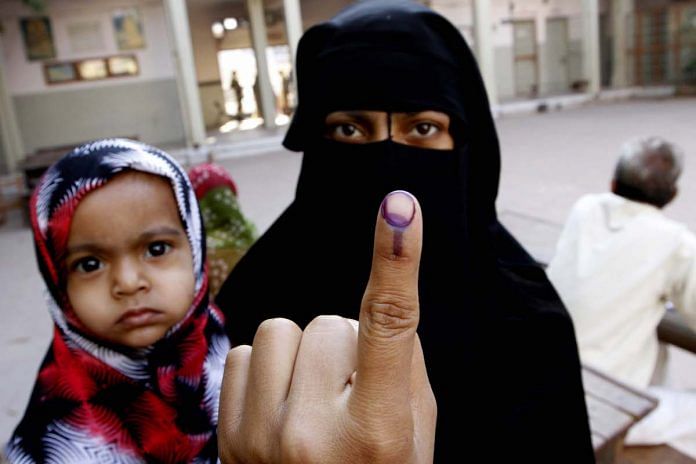There appears to be a consensus to not address Muslims as a potential political category, and view them purely as voters, and not as Muslims.
The electoral response of Muslims in the coming Gujarat election has acquired an interesting symbolic value. Unlike all assembly elections since 2014 (especially the UP election), the political parties, media and even the political commentators do not show any interest in what is often called the Muslim vote bank. In fact, Muslim voting is not seen as a decisive factor that might affect the electoral outcome in the state.
Yet, Muslims as voters and Muslims as candidates are projected as a significant “Other”—a homogeneous group of “minority citizens’—which pose a serious challenge to both the main political parties. The challenge for the BJP, we are told, is to accommodate Muslims into the schema of Vikas—a slogan that is pitched in as the main electoral agenda; while the expectation from the Congress is that it should recognise the plight and victimhood of Muslims so as to regain its traditional support base.
This closed and homogeneous portrayal of Muslim politics of Gujarat in the emerging political narrative is highly misleading. Gujarati Muslims, like any other social group in India, are divided on caste, language, region, class and even religious lines. This internal diversity actually determines the nature of political engagements of these Muslim groups at various levels. This has been the reason why BJP as a political party also gets a sizeable support of Muslims in Gujarat.
Electoral behaviour of Gujarati Muslims
CSDS-Lokniti data offers us some interesting findings that help us in exploring the political attitudes of Muslims of Gujarat in last five years.
In 2012 assembly election, for example, Congress managed to get 69 per cent Muslim votes in the state. But the performance of BJP was not at all bad among Muslims. Around 20 per cent Gujarati Muslims voted for the party.
This electoral trend changed slightly in 2014 Lok Sabha election. The Congress received 64 per cent Muslim votes (a comparative decrease of 5 per cent votes). In the same way, the BJP’s performance also affected as it secured only 16 per cent Muslims votes this time.
The BJP’s performance in 2014 is worth mentioning. The party, which secured 9 per cent Muslim votes at all India level (a significant increase of 3 percentage points Muslim votes in comparison to 2009 Lok Sabha election), could not do well among Gujarati Muslims.
The class-wise Muslim voting pattern further substantiates this line of reasoning. According to the CSDS-Lokniti data, the BJP got a sizeable support (20 per cent) from the middle-class Muslims. But the lower middle classes as well as economically well-off Muslims voted for the Congress. Interesting around 33 per cent poor Muslims rejected both Congress and the BJP.
Are Muslims significant?
The obvious question is: does this Muslim electoral plurality have a role to play in state’s politics in 2017?
The outcomes of previous elections introduce us to two contradictory points. The Muslims of Gujarat certainly do not recognize BJP as their first political choice. In fact, Muslims voters of the state went against the national trend in 2014 and somewhat abandoned both the national parties.
Secondly, and in fact rather paradoxically, the BJP was able to create a space for itself among middle-class Muslims in the last election. Although it would be too early to interpret this middle-class inclination toward BJP, the manner in which the party has employed its Muslim leaders in Muslim concentrated urban constituencies demonstrates its willingness to capitalize on this segment of Muslim voters.
Muslims as absentee voters
But, there is something more. The Muslim voters are going to play two interesting functions in this election. Since the issues of caste-class and development are going to be the ingredients of political discourse in Gujarat, there is a strong possibility that Muslims will be approached purely as voters at the constituency level – and not as Muslims.
There appears to be a consensus to not address Muslims as a potential political category. But inspite of the absent Muslim voter, the projection of Hindutva politics necessitates a rhetorical imagination of the Muslim community as the ‘other’.
This possible political strategy to mobilize Muslim support does not affect the electoral calculations of both the parties. In BJP’s imagination, Muslims as voters fits very well with the slogan of sab ka saath, sab ka vikas. It suits the Congress as well. The Congress is anxious to get rid of the tag of Muslim appeasement. Hence, it requires Muslim backing entirely on its own terms.
The second, and perhaps more powerful, function of a Muslim voter is rather symbolic. Both the main parties are keen to evoke Guajarati Hindu identity as a symbol of development and dignity. The Patidar agitation, marginalization of Dalits in the state and the growing economic anxieties are articulated overtly in a language of Gujarati pride.
Muslims as an identifiable political group cannot be accommodated in this configuration.
This absence of Muslims in the dominant narrative of election is going to be very decisive—it would empower the BJP to assert party’s radical Hindutva image and, at the same time, it would give space for the Congress to justify its unspoken Hindu-centric politics.




muslims r not going to vote 4 bjp no matter what they do, so why should the bjp bother about them ,and the congress has always provided lip service to muslim interest,the muslims if they vote 4 bjp will make bjp dependent on them to some degree so if they have some brains they should vote 4 bjp